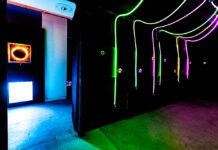The study will investigate if audiences are willing to pay for remote performances and how actors can take their work online and continue to be paid.
Theatres and companies around the country are making staff redundant and the future of many is in jeopardy. The research will be conducted rapidly so the findings are reported and can be of use before the Government’s furlough scheme – which has supported many in the industry – ends.
The research, by Professor Pascale Aebischer and Dr Rachael Nicholas from the University of Exeter in partnership with Creation Theatre in Oxford, is funded by UKRI..
Professor Aebischer will examine Creation Theatre’s new business model as an example of successful digital transformation for small and medium-sized theatres. She will investigate how theatres can charge audiences for online performances so actors continue to get Equity wages. The study will investigate how much people would be willing to pay.
As part of the research Professor Aebischer will develop recommendations to protect actors working at home. This will particularly include how to avoid excluding those with caring responsibilities who may find it hard to work uninterrupted at home.
Professor Aebischer said: “We need to ensure actors’ labour is valued, and the move to working online doesn’t mean they don’t get paid. It is essential to find a business model which works and includes the audience paying for what they see. If we don’t fix this problem great damage will be done to the theatre industry.
“I hope this research will help save jobs and help those working to save this important industry.”
The research will focus on how Creation Theatre and their co-producers Big Telly (Northern Ireland), put on a successful interactive live production of The Tempest. The online show, which had originally been staged in Oxford in 2019, attracted around 1,500 paying viewers from around the world. Actors encouraged the audience – who could see each other – to interact with the show and one another for example by shaking their computer screen and helping with sound effects.
As part of the study staff at the Creation Theatre will be questioned on their recent work, and the challenges of working remotely at home. The Tempest will be restaged by the company and the audience questioned by the research team on their experience of viewing theatre online, and if this taught them digital skills they didn’t have before. They will also be asked if the show helped them feel less isolated and if it made them feel part of a community.
Professor Aebischer said; “The pandemic has shown us that the traditional geographical borders which effect regional theatre may not matter anymore. I’m interested to see what led to the success of the Creation Theatre show, and how other theatres might be able to achieve the same success. They transformed their entire operation to work in a distanced way in a very short period of time.
“The response of some creative teams has shown theatre companies can continue to work and potentially even thrive in a new online environment. There has been a lot of sharing of recordings of past performances by major theatres, but this doesn’t solve the problem of how to pay actors and backstage staff at this time when theatres are closed.
“I hope this research will offer hope and practical knowledge to regional theatres, which are one of the economy’s most vulnerable sectors.”







